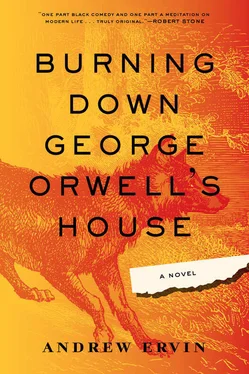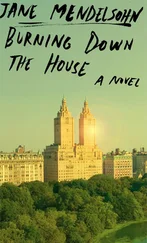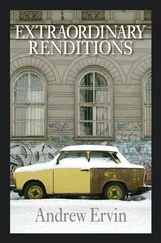The physical reality of Barnhill immediately taught Ray something extraordinary about Nineteen Eighty-Four . He now understood the psyche of the novel’s hero Winston Smith, who would eventually give up his resistance and fall in line with Big Brother. Ray had never before appreciated what a cold and murky world Smith lived in; he was oppressed just as much by his material conditions as by any direct interaction with the authorities. The faulty Victory cigarettes and tear-inducing Victory gin were as destructive to one’s well-being as the threat of a visit from the Thought Police. Were Smith’s bathroom tiles as devoutly stained as these? Did the toilet tank in his apartment gurgle constantly like this one did?
Eric Arthur Blair — known to the reading public as George Orwell — had moved to Jura in May of 1946 and lived here on and off until January of 1949. He arrived shortly after his wife Eileen and beloved sister Marjorie had both passed away. It was a time of food shortages and strict rationing that required real sacrifice and patience of the British working class. London had been scarred by German bombs; even in peacetime he couldn’t walk down the street without reliving the endless nights of hiding underground during the air raids. Rather than fighting for government-handout scraps, Orwell escaped the entire system in order to fend for himself and begin work on what would become the greatest novel in the history of the English language. He caught his own fish and crabs, grew his own vegetables — and Ray would do the same. Only after Orwell finished writing his masterpiece did he agree to seek treatment in Glasgow for the tuberculosis that would kill him just six months after its publication. It had all happened right here.
The upstairs hallway connected three bedrooms and a large bathroom with a claw-foot tub. For his room Ray chose the largest one, over the kitchen, that had windows on three sides and afforded north, east, and south views of the water. The house had come furnished but not very furnished. A few token watercolors hung on the walls. A closet contained sheets and blankets and towels. Coming to live in Orwell’s house was supposed to provide Ray with some clarity, with the wherewithal to mend the fault lines that had appeared in his personality. In doing something as simple as rifling through the closets he felt like he might learn more about how Orwell had lived. Ray wasn’t superstitious enough to believe that he could feel the presence of Orwell’s ghost or anything like that, but there was no mistaking that something intangible remained. The grin on his face felt so foreign.
The initial step toward making Barnhill livable involved trying to get a fire started downstairs. A door from the kitchen led to an uninsulated well room, now used for storage. It contained what appeared to be several metric tons of peat, which someone had gone to the trouble of cutting into bricks and stacking in a crisscross pattern. Depending on how fast it burned, and how cold the house would get at night, it might be enough to warm one room for the duration of his stay. In the corner, a shotgun sat propped up against the wall.
Unlike his former colleagues at Logos, Ray had grown up around guns. He wasn’t one of those fringe lunatics sitting at home crocheting the Second Amendment into throw pillows, but guns didn’t bother him either. Chasing predators from the crops had been one of his chores as a teenager. Considering that he now lived alone at the end of the grid, miles from civilization, it made sense to have one around. He left it where it was and carried an armful of peat bricks back to the sitting room. He fed the least toxic pieces of the partygoers’ leftover garbage to the potbellied stove that filled the fireplace, placed three peat bricks on top, and lit the newspaper with a match — and the room filled with black smoke. It bellowed out from the stove in waves. When his panic subsided, he opened the windows to welcome the fresh air in. He flapped his arms to cajole the smoke outside like an uninvited nun who had come seeking a donation for the local parish. Then he remembered the flue. A metal crank on the side of the stove turned with some reluctance. The smoke rose from the fire and went up the chimney, only to displace a nest of birds that had settled in the stovepipe but were now rendered homeless. Orwell had rubbed his own hands warm by this fireplace. Ray could just picture it.
He swept the swirling dust storms out the door and dumped the contents of his suitcase and backpack onto the sitting-room floor. The clothes smelled like they wanted nothing more than to provide a loving home for some colorful mold. He threw the shirts he would need right away over some dining-room chairs, which he dragged, scraping across the floor, closer to the dancing fire. The smell of the peat made its way into his sinuses and hair. He ripped the new shirts and shorts from their packages and threw the cardboard inserts into the fire.
Once some warmth returned to his fingers and toes, Ray took a walk outside to inspect the property before it got any darker. The garage contained a number of unusual tools and implements, all neatly arranged. He found pumps, motors, a roll of barbed wire. A sealed oil drum filled with some kind of liquid. Sheets of plastic and canvas tarps. He couldn’t even speculate about the purposes of the long poles with angular, medieval blades. A wooden crate contained a length of rope, along with a set of frayed jumper cables and the largest spider outside of an atomic-age monster movie.
On one side of the house sat a small garden suitable for planting vegetables, if he could keep the wandering sheep away from them. The animals had the run of the island. They had bells around their necks and jingled as they walked. There were also fruit and nut trees he couldn’t identify — maybe Orwell had planted them! Ray fastened a rope between two of them and draped an armful of wet shirts and pants over it. Then he peeled off everything he had on and hung his sweaty clothes on the line.
He stood there, naked and fully exposed to the wilderness and the weather. The cold air and steady mist no longer bothered him and he started to laugh and then he kept laughing until he couldn’t breathe. The water in the distance looked so inviting. Some day soon he would go for a swim. More water fell from the sky. He stomped his feet in the mud. Some tense beast inside his belly spotted an exit and went tear-assing for it; his body felt completely relaxed and at ease. He jumped up and down in the biggest puddles he could find, still laughing, splashing, shouting.
For a full hour Ray ran in circles around the garden. He danced and sang and wiggled his arms in the air above his head. He ran to the top of a hill and rolled — literally rolled — back down toward the house, the hair on his chest and groin picking up burrs along the way. Then he jogged back up and did it again. He rubbed wet earth into the new cuts and scrapes that found their way onto his arms and legs and ass cheeks. The mud soon camouflaged every inch, but he piled more onto his head, into his hair. He was transformed. The rain ran down his chest in brown rivers. He stayed outside until the faintest sunlight reflected on the Paps and then set over Colonsay, an island north of Islay and due west of Jura. The wind picked up even further and made gentle sweeping noises in the trees. His clothes flapped like a series of personal flags. He had declared independence.
When the coldness found his skin, he wiped some of the filth from around his eyes. He was eager to pour a whisky and warm up again by the fire. He headed back to the house, but stopped at the front door. A dead animal sat crumpled on the stoop where a welcome mat might go. It could have been a squirrel or a small possum. Impossible to say. It was more than dead: it had been eviscerated. Its exposed entrails sat coiled in a greasy pile on the top step, still steaming. Some larger creature had moments ago sliced this thing open, crept up to the house, and left it at the door as a kind of offering or threat.
Читать дальше












